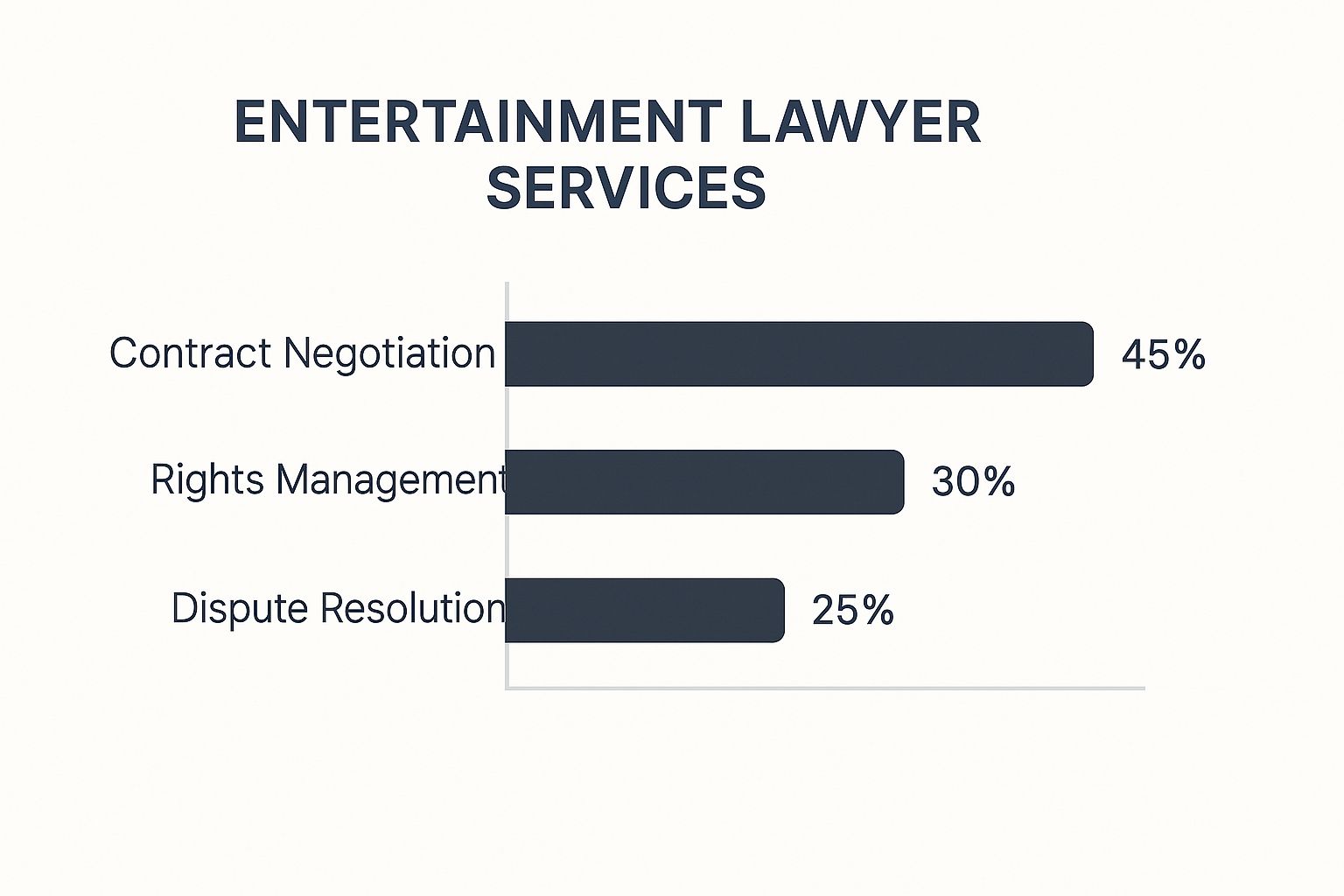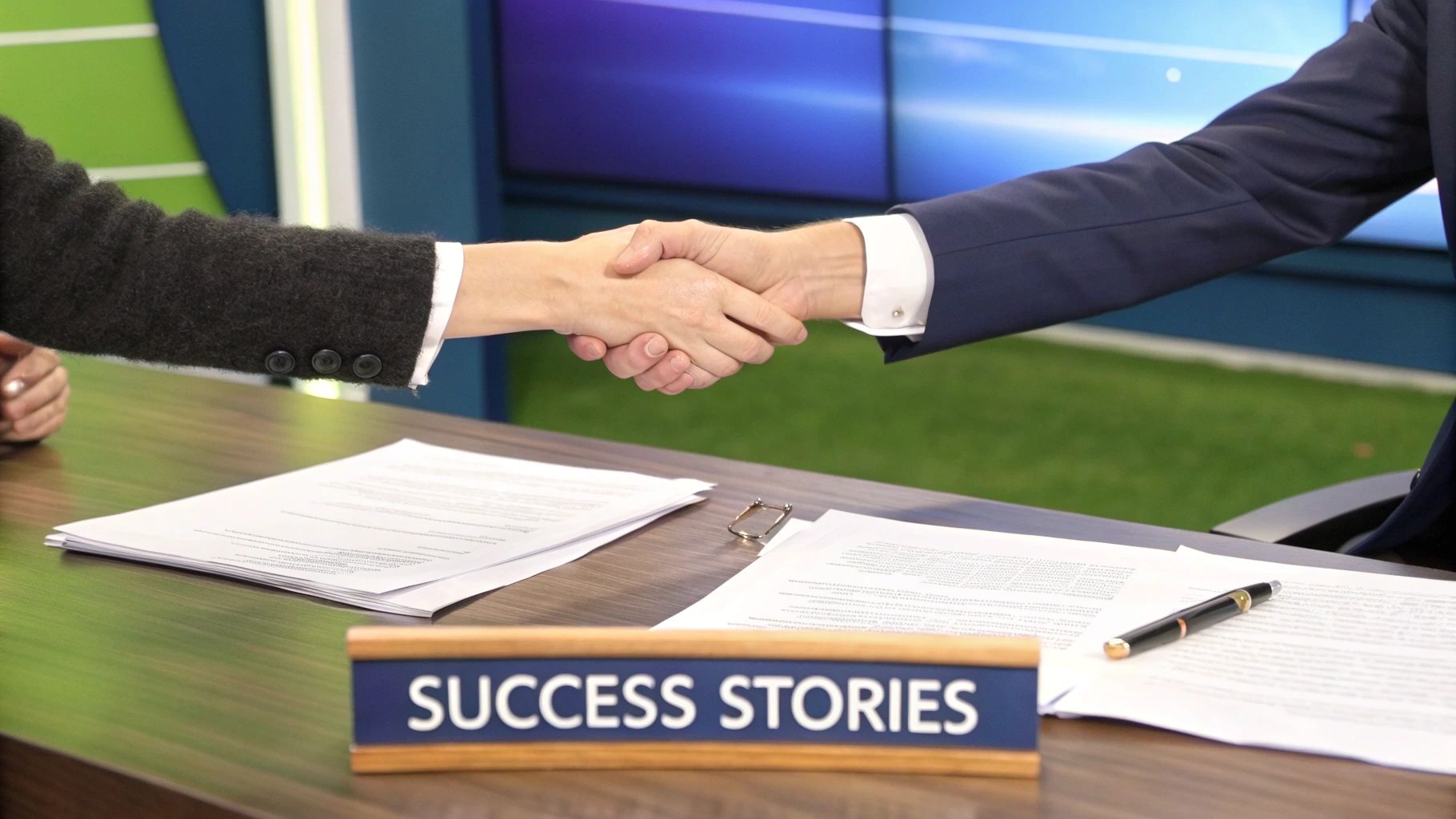The Real Deal: What Is an Entertainment Lawyer?
Entertainment lawyers are the legal professionals bridging the gap between creative endeavors and the often-complex world of contracts. This isn't your typical legal job; it requires a deep understanding of the nuanced relationship between artistic expression and legal protection within industries known for their unique, sometimes baffling, rules. These specialized attorneys represent a wide range of clients, from high-profile celebrities to independent filmmakers, spanning film, television, music, publishing, and digital media.
Working in entertainment law isn't always glamorous. A significant portion of the job involves reviewing contracts, ensuring legal compliance, and protecting the rights of clients. The entertainment industry operates with its own set of customs and practices, often quite different from traditional corporate law. One moment you might be explaining contract law to a Grammy-winning artist, the next you could be unraveling a complicated web of intellectual property rights for a documentary filmmaker.
More Than Just Contracts (Though There Are a Lot of Those)
Entertainment law is more than a niche area of practice; it's a distinct legal universe incorporating elements of intellectual property, contract law, labor regulations, and business strategy. You might be interested in: our sitemap with more legal topics. The work can be incredibly rewarding, offering the chance to contribute to exciting projects, from negotiating film deals to crafting music contracts. The demand for entertainment law services is also increasing, particularly in entertainment hubs like Los Angeles and New York. Learn more about entertainment law career opportunities.
Navigating the Legal Galaxy of Entertainment
Entertainment law is undeniably complex. It encompasses everything from force majeure clauses (a legal term for unforeseen circumstances) to profit participation waterfalls (the distribution of profits among various stakeholders). Other key aspects include rights of publicity, droit moral (an artist's right to protect their work's integrity), and the constantly evolving landscape of digital rights.
While some aspects of entertainment law are highly technical, others involve explaining complicated legal concepts in clear, understandable terms. This blend of technical expertise and communication skills contributes to both the excitement and the challenges of the field.

What Entertainment Lawyers Actually Do All Day
Entertainment lawyers wear many hats. One minute they're negotiating a production deal, the next they're explaining copyright termination to a songwriter. The scope of entertainment law is vast, but contract work is the core. It's easily 80% of the job. Drafting and negotiating agreements—all day, every day—is the name of the game, ensuring clients are protected while still allowing deals to happen.
Entertainment lawyers deal with all aspects of intellectual property: copyrights, trademarks, rights of publicity. They structure talent agreements, addressing every detail, from compensation to creative control. Many entertainment lawyers specialize. Music attorneys focus on publishing rights and recording agreements, while film lawyers handle financing and distribution. Digital media specialists are essentially inventing law as technology outpaces regulation.
Beyond the Contracts: More Than Meets the Eye
While some may explore other career options, such as Fractional Executive Jobs, a focus on entertainment law demands specialized knowledge. However, being too narrow can be limiting. The best entertainment lawyers seamlessly transition between different entertainment sectors. This is because the fundamentals remain the same: protecting creative work, ensuring fair compensation, and navigating industry-specific regulations. These principles are consistent across film, music, and digital platforms.
Specialization vs. Generalization: Finding Your Niche
Specializations are important. Entertainment lawyers often cluster in hubs like Los Angeles and New York. However, some build thriving practices in unexpected locations. For example, Kenneth J. Abdo has a successful practice in Minneapolis, focusing on music law and artist advocacy. His work includes contract review, negotiations, and more. Learn more about entertainment lawyers making a difference here. This proves success is possible wherever talent is found. To better understand specializations, let's look at the following data chart:
This data chart illustrates the typical breakdown of tasks for entertainment lawyers across different specialties.

As shown, contract negotiation and drafting dominate, consuming 70% to 85% of an entertainment lawyer’s time. Intellectual property management is the next most common task, followed by litigation and dispute resolution, which thankfully occupies the smallest percentage. However, that small percentage can be incredibly intense and high-stakes.
To further illustrate the various areas within entertainment law, the following table offers a comparison of major specializations:
Entertainment Law Practice Areas
| Practice Area | Primary Responsibilities | Common Client Types | Key Legal Documents |
|---|---|---|---|
| Music Law | Contract negotiation (recording, publishing, licensing), Copyright and trademark registration, Royalty collection | Musicians, songwriters, bands, record labels, music publishers | Recording agreements, Publishing agreements, Licensing agreements |
| Film Law | Development, financing, production, and distribution agreements, Guild regulations (SAG-AFTRA, DGA, WGA), Rights clearances | Film producers, studios, distributors, actors, directors, writers | Option agreements, Production agreements, Distribution agreements |
| Television Law | Development, production, and distribution agreements, Network regulations (FCC), Talent agreements (actors, writers, directors) | Television producers, networks, studios, actors, writers, directors | Development agreements, Production agreements, License agreements |
| Digital Media Law | Online content creation and distribution agreements, Intellectual property protection in digital spaces, Social media law | Influencers, bloggers, YouTubers, digital media companies, app developers | Terms of service, Privacy policies, Content licensing agreements |
| Video Game Law | Development, publishing, and licensing agreements, Intellectual property protection (characters, storylines, music), Esports law | Game developers, publishers, esports teams, individual players | Development agreements, Publishing agreements, Esports contracts |
This table highlights the diverse responsibilities and client types within each specialization, as well as the important legal documents they work with.
So, What Does This All Mean?
Being an entertainment lawyer is more than just knowing the law. It's about understanding the industry, building relationships, and navigating its complexities. It's intense, fast-paced, and dramatic. But it's also quite rewarding.
A Day in My Life as an Entertainment Attorney
Wondering what we actually do all day? It's definitely not all glamorous meetings with celebrities. (Though, they do happen occasionally—and yes, they're pretty cool when they're not incredibly stressful.) The truth is, there's no "typical" day in entertainment law. I might wake up to urgent emails from a client three time zones away demanding revisions "yesterday." Yesterday! It's like they think I have a time machine. Sometimes, I feel like I need one.
From Redlines to Red Carpets (Okay, Maybe Not Every Day)
By 8 AM, I'm usually buried in redlining a 70-page agreement, juggling calls with three different clients who all believe their crisis is DEFCON 1. Entertainers, artists, and creative professionals aren't exactly known for their adherence to traditional 9-to-5 schedules. This means we're pretty much always on call. I've lost count of how many times I've taken a call at 9 PM because a client needs an immediate answer on a deal.
Look, sometimes it is glamorous—the premieres, the after-parties. But 90% of this job is grinding it out—emails, calls, and endless negotiations. That other 10%? That's what makes it worthwhile. Getting a great deal for a young musician, protecting a filmmaker's vision, and seeing your client succeed. That's the fuel.
Wrangling Contracts, Copyright, and Creative Chaos
Afternoons could involve a negotiation—trying to secure better terms for a client without derailing the entire project (this happens more often than you'd think). Later, I might be advising a musician on a potential copyright infringement that just popped up—probably on TikTok—or maybe I'm reviewing chain-of-title for an indie film. Chain-of-title, by the way, is just lawyer-speak for proving who owns what. It's important stuff, especially if you actually want to make your movie.
And then there’s the “therapist” part of the job. Talking a client down after a deal falls apart, or—and this is a big one—managing expectations. Because what a client wants to do isn't always what they can do legally. This industry operates on vibes, and those vibes can be incredibly unpredictable. But that’s part of the charm, right? I mean, it would be boring if it was all predictable. (Actually, no, it would probably be relaxing. But boring, too.)

Breaking Into Entertainment Law: The Unfiltered Truth
So, you dream of being an entertainment lawyer? Get ready for a challenging journey. The path to Hollywood (or Nashville, or wherever your entertainment law aspirations lie) isn't always glamorous. The initial steps might seem straightforward: earn a J.D., pass the bar exam, and so on. However, the reality of specializing in entertainment law often requires a unique blend of luck, solid connections, and unwavering determination.
The Real Deal: Not All Red Carpets and After-Parties
Many entertainment lawyers, including myself, began their careers in general practice. This provided a crucial foundation in core legal skills, the essential groundwork that often gets overlooked. From there, some find a way to transition into entertainment law. Another common path is starting as an overworked associate at an entertainment law firm. This often involves long hours and dedication, hoping to gain recognition for your hard work. Internships and clerkships, especially at studios, production companies, or talent agencies, are invaluable for building those essential connections. In this industry, connections are incredibly important.
My own journey started at a soul-crushing mid-size corporate firm. Eventually, I realized I could combine my passion for film and music with my legal career. The transition wasn't easy, involving pay cuts, risks, and moments of doubt. You might find helpful information on our sitemap: Check it out here
The Hard Truth About Entertainment Law
Frankly, it's a highly competitive field. The allure of the entertainment industry attracts numerous law school graduates, leading to a significant imbalance between applicants and available positions. While specialized courses are becoming increasingly common, they can't replicate real-world experience. In-depth industry knowledge is incredibly valuable.
Persistence, Passion, and a Little Bit of Luck
The competition is fierce, and it's not always glamorous. However, if you have a genuine passion for entertainment law and are willing to put in the effort, you might succeed. It won't be easy. The analogy I promised? Breaking into entertainment law is like climbing Mount Everest in stilettos: stylish, yet impractical, painful, and potentially disastrous (figuratively speaking, of course…usually).
The Essential Toolkit: Beyond Just Legal Skills
So, you aced the bar, you can differentiate contract law from copyright – congratulations, you're officially a lawyer. But, and it's a significant but, being a successful entertainment lawyer demands a whole other skill set. Sure, you might know how to hold a scalpel, but can you perform open-heart surgery? Probably not. This section explores the real necessities for thriving in this often unpredictable industry.
Negotiation Ninja: More Than Just Table-Pounding
First and foremost, you need top-notch negotiation skills. Forget the aggressive, "win at all costs" approach. That might work on television, but in the real world, it damages relationships quickly. Entertainment deals are complex puzzles with countless moving parts. You must find solutions that benefit everyone involved while still protecting your client's best interests. It's a delicate balancing act, not a battle.
The Relationship Whisperer: Building Your Network
Relationship building is paramount. This industry thrives on connections and who you know, and, perhaps more importantly, who knows you and likes you. I've seen brilliant lawyers ruin their careers by treating people poorly. Entertainment is a close-knit community – everyone knows everyone – so burning bridges is professional suicide. Focus on building genuine, long-term relationships. Entertainment executives might change companies frequently, but they never forget who mistreated them.
Contract Master: Decoding the Legal Jargon
You'll spend countless hours reviewing contracts: drafting, revising, and identifying those hidden clauses that can make or break a deal. Being able to explain complex legal terminology to clients who just want to create art is another vital skill. They typically don't speak "legalese," so clear communication is essential.
To better understand how these skills interplay, take a look at the table below:
Essential Skills for Entertainment Lawyers
A comparison of technical legal skills versus industry-specific knowledge needed for success
| Skill Category | Importance Rating | How It's Applied | Development Methods |
|---|---|---|---|
| Contract Drafting & Review | High | Analyzing agreements, identifying risks, protecting client interests | Legal education, practical experience, mentorship |
| Negotiation | High | Structuring deals, finding common ground, resolving disputes | Negotiation workshops, simulations, on-the-job training |
| Relationship Building | High | Networking, maintaining client relationships, collaborating with industry professionals | Industry events, mentorship, communication skills training |
| Industry Knowledge | High | Understanding deal terms, market rates, industry trends | Industry publications, networking, continuing education |
| Business Acumen | Medium | Advising on financial implications, strategic decision-making | Business courses, financial analysis training |
| Adaptability | Medium | Responding to industry changes, embracing new technologies | Continuous learning, staying informed about industry trends |
This table highlights the crucial skills needed for success in entertainment law, emphasizing both legal expertise and industry-specific knowledge. Developing these abilities is an ongoing process that requires a combination of formal education, practical experience, and active engagement with the entertainment community.
Industry Insider: Knowing the Unwritten Rules
Understanding the industry inside and out is vital. What are the typical deal terms? What are the current market rates? What constitutes a "good" deal versus a "great" one? Without this knowledge, you're essentially operating without crucial context.
Business Brain: Thinking Beyond the Law
This aspect is often overlooked. Entertainment lawyers aren't just legal advisors; they're also business strategists. You're advising clients on decisions with significant financial consequences, so basic business sense is essential. You need to understand things like pro forma financial projections – how a client anticipates their budget.
The Adaptability Ace: Embracing the Ever-Changing Landscape
Finally, adaptability is key. The entertainment industry is constantly changing. New technologies, new platforms, new ways of conducting business – if you can't adapt, you'll be left behind.
To summarize, being a successful entertainment lawyer requires much more than legal knowledge. It's a combination of legal expertise, soft skills, and industry awareness.
The Dark Side: Challenges and Ethical Dilemmas
Entertainment law. Sounds glamorous, right? The glitz, the glamour, rubbing shoulders with celebrities. Sure, that's a piece of it. But, and this is a significant "but," it's not all red carpets and after-parties. This field presents unique challenges and ethical dilemmas that can make even the most experienced lawyer second-guess their career path.
Conflict of Interest City: Navigating a Small World
The entertainment world is surprisingly interconnected. This close-knit environment creates a breeding ground for conflicts of interest. Imagine representing a musician in a contract dispute with a record label, only to have the label's CEO approach you the following week seeking representation in a different matter. This scenario, while complex, is more common than you might think. I once had to decline a lucrative opportunity due to prior representation of the opposing party. While it was a financial hit, ethically, it was the only option. Doing what's right is paramount.
The Confidentiality Conundrum: Loose Lips Sink Ships (and Careers)
Confidentiality is the lifeblood of the entertainment industry. A single careless whisper or misplaced email can cause irreparable damage to a client's reputation and your own. News travels at warp speed, especially in the age of social media. Maintaining client trust hinges on airtight confidentiality. (For a deeper dive into legal aspects, browse our sitemap at Cordero Law.) This is particularly tricky in entertainment, where information is often a valuable commodity.
Tech Troubles: The Law Tries to Catch Up
The technological landscape is constantly evolving. New platforms, distribution models, and AI-generated content create a legal Wild West. The law struggles to keep pace, presenting ongoing challenges for entertainment lawyers. Emerging technologies like AI, NFTs, and the metaverse pose questions we haven't even begun to consider.
The Blurred Lines of Business and Law: More Than Just Legal Advice
Entertainment lawyers often serve as de facto business advisors, providing clients with strategic guidance beyond legal expertise. This dual role requires a delicate balancing act. Knowing where the line falls between legal counsel and business strategy isn't always clear. It's a constant learning process, and one that keeps me on my toes.
The Creative Client Conundrum: When Contracts Become "Suggestions"
Finally, there are the clients themselves. Creative individuals can have unique perspectives on legal agreements. Contracts are sometimes seen as mere suggestions rather than binding documents. Try explaining a force majeure clause to a musician eager to tour or convincing a film producer they can't simply use any song they like. It takes patience, diplomacy, and a healthy dose of deep breaths. The entertainment world may look glamorous from the outside, but it presents its own set of complex challenges.

Where Entertainment Law Is Headed: Future Frontiers
The entertainment law landscape is in constant flux. Predicting the future with absolute certainty is impossible, especially in this rapidly evolving field. The emergence of digital platforms has fundamentally altered how we create, distribute, and monetize content, rendering many established legal frameworks obsolete. It's like trying to navigate the modern world with outdated tools.
Streaming, Blockchain, and NFTs: Navigating New Terrain
Streaming services have disrupted traditional revenue models for film and music, presenting both exciting opportunities and complex challenges. Protecting and valuing artistic creations in the digital age requires innovative legal solutions. Blockchain and NFTs are particularly intriguing, introducing novel legal questions surrounding ownership and intellectual property. While these technologies offer the potential to streamline processes like music rights tracking, they also create new complexities for legal professionals grappling with how existing laws apply in this uncharted territory.
Globalization and the Rise of the Creator Economy: Expanding Horizons
The entertainment market's increasing globalization means a surge in international deals and collaborations. This necessitates a deep understanding of diverse legal systems across different countries. Many U.S. entertainment lawyers are now facing the challenge of expanding their expertise in international law to effectively navigate these cross-border transactions. The burgeoning creator economy and direct-to-consumer models are democratizing content creation. Anyone with a smartphone can now become a filmmaker or musician. This expansion means entertainment law is relevant to a far wider audience than ever before, from major studios to individual creators. Even a YouTube chef creating cooking videos with drones needs legal counsel, highlighting the broadening reach of this field. Using advanced AI Chatbots could potentially streamline client communication in this evolving landscape, but they also raise new concerns regarding data privacy and security. It's a complex interplay where technology simultaneously creates both the problems and potential solutions.
The AI Revolution: Copyright in the Age of Machines: Rethinking Ownership
AI and automation are transforming how entertainment content is generated, raising fundamental questions about authorship and ownership. If AI writes a song, who owns the copyright? Can something created by an algorithm even be owned? These are the kinds of complex questions that will keep lawyers busy for years to come, as courts and legal frameworks struggle to catch up with these technological advancements.
Adaptability Is Key (Or: How to Survive the Future of Entertainment Law): Embracing Change
The future of entertainment law is likely to be dynamic and unpredictable. As traditional rules break down and new ones emerge, adaptability and a willingness to embrace change will be crucial for success. The most effective entertainment lawyers won't necessarily be those from prestigious law schools or large firms, but rather those who can adapt quickly and take calculated risks, even representing clients like the drone-using YouTube chef.
Ready to navigate the exciting and evolving world of entertainment law? Contact Cordero Law today. We can help you protect your creative work and build a successful career in the entertainment industry. Visit our website to learn more about our services.
